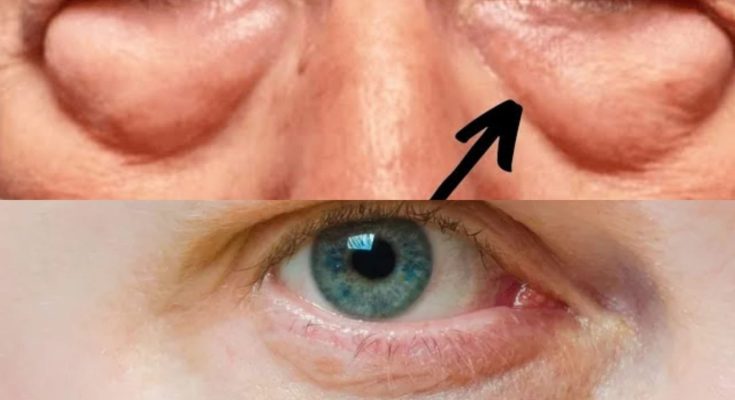The Shocking Truth About Under-Eye Bags and Dark Circles The Most Dangerous Causes
Dark circles and under-eye bags are frequent cosmetic issues that a lot of individuals deal with. Even while they are frequently innocuous and brought on by things like heredity or insufficient sleep, there may be more serious underlying issues that need to be taken into consideration. Let’s examine the most harmful causes of dark circles and under-eye bags and what they might indicate for your health.
1. Issues with the kidneys
- Kidney problems are one of the most concerning causes of under-eye bags and dark circles that don’t go away. The region surrounding the eyes is highly susceptible to fluid retention, and edema and puffiness can result from renal function issues. It’s crucial to get evaluated by a doctor if you have weariness, changes in your urination, or other symptoms in addition to under-eye bags.
2. Prolonged Sinus Problems
- Congestion brought on by chronic sinusitis or sinus infections can result in dark circles and pressure under the eyes. This occurs when blood flow is restricted by sinus congestion, which causes the blood vessels under the eyes to enlarge and produce puffy, dark patches. Dark circles along with headaches, nasal congestion, or sinus difficulties on a regular basis may be signs of a more serious sinus disease.
3. Issues with the Thyroid
- Dark circles beneath the eyes and puffiness might be symptoms of hypothyroidism or other thyroid conditions. The thyroid gland controls a number of bodily functions, including fluid equilibrium. Weak thyroid function can cause edema, exhaustion, and other symptoms. Seeking medical attention for persistent under-eye bags, weight fluctuations, hair loss, or cold sensation may indicate that your thyroid needs to be examined.
4. Sensitivities
- Under-eye bags and dark circles may be largely caused by allergic reactions, particularly seasonal allergies. Allergies create swelling and irritation around the eyes, making the blood vessels more noticeable in that area. Additionally, dark circles may appear worse if you wipe your eyes a lot because you’re itchy. During allergy season, if you observe puffiness and dark circles under your eyes, it could be time to consider treatment options.
5. Problems with the Liver
- The liver is in charge of cleansing the blood, and liver dysfunction can occasionally cause dark circles beneath the eyes. Toxin accumulation in the body from diseases like hepatitis or liver illness can make the skin under the eyes appear darker. It’s critical to get medical help right once if yellowing of the skin or eyes coexists with dark circles.
6. Low blood sugar
- Dark circles are frequently caused by anemia, especially iron-deficiency anemia, which is a dangerous condition. Anemia is a condition in which the body lacks sufficient healthy red blood cells to supply oxygen to the tissues, resulting in pale skin and dark bags under the eyes. Shortness of breath, tiredness, and dizziness are further symptoms. A straightforward blood test can verify anemia suspicions, and dietary adjustments or supplements might support the condition.
7. Apnea during sleep
- A person with sleep apnea experiences breathing disruptions while they are asleep, which results in restless nights. Due to oxygen shortage and irregular sleep patterns, people with sleep apnea frequently wake up with bags under their eyes and dark circles under their eyes. See a doctor to rule out sleep apnea if you wake up feeling exhausted even after getting a full night’s sleep or if you snore loudly.
Additional Reasons for Dark Circles and Under-Eye Bags:
- Aging: As we become older, the skin around our eyes thins and fat may shift, making bags and circles more noticeable.
- Dehydration: Not getting enough water can make the skin around your eyes appear drab and black and make puffiness worse.
- Poor Diet: Swelling and water retention around the eyes can result from diets heavy in processed foods or salt.
How to Deal with the Issue:
- Addressing the underlying problem is crucial if you’re struggling with dark circles or under-eye bags. Here are some pointers:
- If you think you may have an underlying medical condition, such as kidney, liver, or thyroid issues, see a doctor.
- Sustain a regular sleep pattern and make sure you get uninterrupted, restorative sleep to improve the quality of your sleep.
- Antihistamines and allergy medications can be used to treat allergies and lessen puffiness and inflammation.
- To promote your overall health, adopt a nutrient-rich, balanced diet and stay hydrated.
In conclusion, pay attention to the signs.
- Even though dark circles and under-eye bags are frequently written off as cosmetic concerns, they can occasionally indicate more serious health problems. Persistent puffiness and dark circles should be taken seriously, since they may indicate allergies, anemia, or more serious conditions including renal or thyroid problems. To find the underlying cause and maintain your health, it’s best to speak with a healthcare provider if you’re also suffering additional symptoms.



